 Tìm kiếm
Tìm kiếm
Chương I Luật bảo hiểm y tế 2008: Những quy định chung
| Số hiệu: | 25/2008/QH12 | Loại văn bản: | Luật |
| Nơi ban hành: | Quốc hội | Người ký: | Nguyễn Phú Trọng |
| Ngày ban hành: | 14/11/2008 | Ngày hiệu lực: | 01/07/2009 |
| Ngày công báo: | 14/03/2009 | Số công báo: | Từ số 147 đến số 148 |
| Lĩnh vực: | Bảo hiểm | Tình trạng: | Còn hiệu lực |
TÓM TẮT VĂN BẢN
Văn bản tiếng việt
Văn bản tiếng anh
1. Luật này quy định về chế độ, chính sách bảo hiểm y tế, bao gồm đối tượng, mức đóng, trách nhiệm và phương thức đóng bảo hiểm y tế; thẻ bảo hiểm y tế; phạm vi được hưởng bảo hiểm y tế; tổ chức khám bệnh, chữa bệnh cho người tham gia bảo hiểm y tế; thanh toán chi phí khám bệnh, chữa bệnh bảo hiểm y tế; quỹ bảo hiểm y tế; quyền và trách nhiệm của các bên liên quan đến bảo hiểm y tế.
2. Luật này áp dụng đối với tổ chức, cá nhân trong nước và tổ chức, cá nhân nước ngoài tại Việt Nam có liên quan đến bảo hiểm y tế.
3. Luật này không áp dụng đối với bảo hiểm y tế mang tính kinh doanh.
Trong Luật này, các từ ngữ dưới đây được hiểu như sau:
1. Bảo hiểm y tế là hình thức bảo hiểm được áp dụng trong lĩnh vực chăm sóc sức khỏe, không vì mục đích lợi nhuận, do Nhà nước tổ chức thực hiện và các đối tượng có trách nhiệm tham gia theo quy định của Luật này.
2. Bảo hiểm y tế toàn dân là việc các đối tượng quy định trong Luật này đều tham gia bảo hiểm y tế.
3. Quỹ bảo hiểm y tế là quỹ tài chính được hình thành từ nguồn đóng bảo hiểm y tế và các nguồn thu hợp pháp khác, được sử dụng để chi trả chi phí khám bệnh, chữa bệnh cho người tham gia bảo hiểm y tế, chi phí quản lý bộ máy của tổ chức bảo hiểm y tế và những khoản chi phí hợp pháp khác liên quan đến bảo hiểm y tế.
4. Người sử dụng lao động bao gồm cơ quan nhà nước, đơn vị sự nghiệp công lập, đơn vị vũ trang nhân dân, tổ chức chính trị, tổ chức chính trị - xã hội, tổ chức chính trị xã hội - nghề nghiệp, tổ chức xã hội, tổ chức xã hội - nghề nghiệp, doanh nghiệp, hợp tác xã, hộ kinh doanh cá thể và tổ chức khác; tổ chức nước ngoài, tổ chức quốc tế hoạt động trên lãnh thổ Việt Nam có trách nhiệm đóng bảo hiểm y tế.
5. Cơ sở khám bệnh, chữa bệnh bảo hiểm y tế ban đầu là cơ sở khám bệnh, chữa bệnh đầu tiên theo đăng ký của người tham gia bảo hiểm y tế và được ghi trong thẻ bảo hiểm y tế.
6. Giám định bảo hiểm y tế là hoạt động chuyên môn do tổ chức bảo hiểm y tế tiến hành nhằm đánh giá sự hợp lý của việc cung cấp dịch vụ y tế cho người tham gia bảo hiểm y tế, làm cơ sở để thanh toán chi phí khám bệnh, chữa bệnh bảo hiểm y tế.
1. Bảo đảm chia sẻ rủi ro giữa những người tham gia bảo hiểm y tế.
2. Mức đóng bảo hiểm y tế được xác định theo tỷ lệ phần trăm của tiền lương, tiền công, tiền lương hưu, tiền trợ cấp hoặc mức lương tối thiểu của khu vực hành chính (sau đây gọi chung là mức lương tối thiểu).
3. Mức hưởng bảo hiểm y tế theo mức độ bệnh tật, nhóm đối tượng trong phạm vi quyền lợi của người tham gia bảo hiểm y tế.
4. Chi phí khám bệnh, chữa bệnh bảo hiểm y tế do quỹ bảo hiểm y tế và người tham gia bảo hiểm y tế cùng chi trả.
5. Quỹ bảo hiểm y tế được quản lý tập trung, thống nhất, công khai, minh bạch, bảo đảm cân đối thu, chi và được Nhà nước bảo hộ.
1. Nhà nước đóng hoặc hỗ trợ tiền đóng bảo hiểm y tế cho người có công với cách mạng và một số nhóm đối tượng xã hội.
2. Nhà nước có chính sách ưu đãi đối với hoạt động đầu tư từ quỹ bảo hiểm y tế để bảo toàn và tăng trưởng quỹ. Nguồn thu của quỹ và số tiền sinh lời từ hoạt động đầu tư từ quỹ bảo hiểm y tế được miễn thuế.
3. Nhà nước tạo điều kiện để tổ chức, cá nhân tham gia bảo hiểm y tế hoặc đóng bảo hiểm y tế cho các nhóm đối tượng.
4. Nhà nước khuyến khích đầu tư phát triển công nghệ và phương tiện kỹ thuật tiên tiến trong quản lý bảo hiểm y tế.
1. Chính phủ thống nhất quản lý nhà nước về bảo hiểm y tế.
2. Bộ Y tế chịu trách nhiệm trước Chính phủ thực hiện quản lý nhà nước về bảo hiểm y tế.
3. Bộ, cơ quan ngang bộ trong phạm vi nhiệm vụ, quyền hạn của mình phối hợp với Bộ Y tế thực hiện quản lý nhà nước về bảo hiểm y tế.
4. Uỷ ban nhân dân các cấp trong phạm vi nhiệm vụ, quyền hạn của mình thực hiện quản lý nhà nước về bảo hiểm y tế tại địa phương.
Chủ trì, phối hợp với các bộ, cơ quan ngang bộ, cơ quan, tổ chức có liên quan thực hiện nhiệm vụ sau đây:
1. Xây dựng chính sách, pháp luật về bảo hiểm y tế, tổ chức hệ thống y tế, tuyến chuyên môn kỹ thuật y tế, nguồn tài chính phục vụ công tác bảo vệ, chăm sóc và nâng cao sức khỏe nhân dân dựa trên bảo hiểm y tế toàn dân;
2. Xây dựng chiến lược, quy hoạch, kế hoạch tổng thể phát triển bảo hiểm y tế;
3. Ban hành danh mục thuốc, vật tư y tế, dịch vụ kỹ thuật thuộc phạm vi được hưởng của người tham gia bảo hiểm y tế và các quy định chuyên môn kỹ thuật liên quan đến khám bệnh, chữa bệnh bảo hiểm y tế;
4. Xây dựng và trình Chính phủ các giải pháp nhằm bảo đảm cân đối quỹ bảo hiểm y tế;
5. Tuyên truyền, phổ biến chính sách, pháp luật về bảo hiểm y tế;
6. Chỉ đạo, hướng dẫn tổ chức triển khai thực hiện chế độ bảo hiểm y tế;
7. Thanh tra, kiểm tra, xử lý vi phạm và giải quyết khiếu nại, tố cáo về bảo hiểm y tế;
8. Theo dõi, đánh giá, tổng kết các hoạt động trong lĩnh vực bảo hiểm y tế;
9. Tổ chức nghiên cứu khoa học và hợp tác quốc tế về bảo hiểm y tế.
1. Trong phạm vi nhiệm vụ, quyền hạn của mình, Uỷ ban nhân dân các cấp có trách nhiệm sau đây:
a) Chỉ đạo tổ chức triển khai thực hiện chính sách, pháp luật về bảo hiểm y tế;
b) Bảo đảm kinh phí đóng bảo hiểm y tế cho các đối tượng được ngân sách nhà nước đóng hoặc hỗ trợ theo quy định của Luật này;
c) Tuyên truyền, phổ biến chính sách, pháp luật về bảo hiểm y tế;
d) Thanh tra, kiểm tra, xử lý vi phạm và giải quyết khiếu nại, tố cáo về bảo hiểm y tế.
2. Ngoài việc thực hiện trách nhiệm quy định tại khoản 1 Điều này, Uỷ ban nhân dân tỉnh, thành phố trực thuộc trung ương còn có trách nhiệm quản lý, sử dụng nguồn kinh phí theo quy định tại khoản 2 Điều 35 của Luật này.
1. Tổ chức bảo hiểm y tế có chức năng thực hiện chế độ, chính sách, pháp luật về bảo hiểm y tế, quản lý và sử dụng quỹ bảo hiểm y tế.
2. Chính phủ quy định cụ thể về tổ chức, chức năng, nhiệm vụ và quyền hạn của tổ chức bảo hiểm y tế.
Định kỳ 3 năm, Kiểm toán nhà nước thực hiện kiểm toán quỹ bảo hiểm y tế và báo cáo kết quả với Quốc hội.
Trường hợp Quốc hội, Uỷ ban thường vụ Quốc hội hoặc Chính phủ yêu cầu, Kiểm toán nhà nước thực hiện kiểm toán đột xuất quỹ bảo hiểm y tế.
1. Không đóng hoặc đóng bảo hiểm y tế không đầy đủ theo quy định của Luật này.
2. Gian lận, giả mạo hồ sơ, thẻ bảo hiểm y tế.
3. Sử dụng tiền đóng bảo hiểm y tế, quỹ bảo hiểm y tế sai mục đích.
4. Cản trở, gây khó khăn hoặc làm thiệt hại đến quyền, lợi ích hợp pháp của người tham gia bảo hiểm y tế và của các bên liên quan đến bảo hiểm y tế.
5. Cố ý báo cáo sai sự thật, cung cấp sai lệch thông tin, số liệu về bảo hiểm y tế.
6. Lợi dụng chức vụ, quyền hạn, chuyên môn, nghiệp vụ để làm trái với quy định của pháp luật về bảo hiểm y tế.
Article 1. Governing scope and subjects of application
1. This Law provides the health insurance regime and policies, including participants, premium rates, responsibilities and methods of payment of health insurance premiums; health insurance cards; eligible health insurance beneficiaries; medical care for the insured; payment of costs of medical care covered by health insurance; health insurance fund; and rights and responsibilities of parties involved in health insurance.
2. This Law applies to domestic and foreign organizations and individuals in Vietnam that are involved in health insurance.
3. This Law does not apply to commercial health insurance.
Article 2. Interpretation of terms
In this Law, the terms below are construed as follows:
1. Health insurance is a form of insurance applied in the health care sector for non-profit purposes, organized by the State and joined by responsible persons under this Law.
2. All-people health insurance means health insurance joined by all persons prescribed in this Law.
3. Health insurance fund means a financial facility set up from health insurance premium payments and other lawful collections, which is used to cover costs of medical care for the insured, managerial costs of health insurance institutions and other lawful costs related to health insurance.
4. Employers include state agencies, public non-business units, people’s armed forces units, political organizations, socio-political organizations, socio-political-professional organizations, social organizations, socio-professional organizations, enterprises, cooperatives, individual business households and other organizations; foreign organizations; and international organizations operating in the Vietnamese territory, which are responsible for making health insurance contributions.
5. Health insurance-covered primary care provider means the first medical examination and treatment establishment registered by an insured and indicated in the health insurance card.
6. Health insurance assessment means professional activities conducted by a health insurance institution to evaluate the reasonableness of medical care services provided to an insured serving as a basis for the payment of costs of health insurance-covered medical care.
Article 3. Health insurance principles
1. Ensuring the sharing of risks among the insured.
2. Health insurance premiums shall be determined in percentage of wage, remuneration, pension, allowance or minimum salary in the administrative sector (below referred to as the minimum salary).
3. Health insurance benefits shall be based on the seriousness of sickness and category of beneficiaries within the scope of the insured’s benefits.
4. Costs of health insurance-covered medical care shall be jointly paid by the health insurance fund and the insured.
5. The health insurance fund shall be managed in a centralized, unified, public and transparent manner, ensuring the balance between revenue and expenditure, and be protected by the State.
Article 4. State policies on health insurance
1. The State pays, or assists payment of, health insurance premiums for people with meritorious services to the revolution and a number of social beneficiary groups.
2. The State adopts preferential policies for the health insurance fund’s investments in order to preserve and increase the fund. The fund’s revenues and profits from its investments are tax-free.
3. The State creates favorable conditions for organizations and individuals to join health insurance or pays health insurance premiums for several beneficiary groups.
4. The State encourages investment in technological development and advanced technical facilities for health insurance management.
Article 5. State management agencies in charge of health insurance
1. The Government performs the unified state management of health insurance.
2. The Ministry of Health shall take responsibility before the Government for performing the state management of health insurance.
3. Ministries and ministerial-level agencies shall, within the ambit of their tasks and powers, coordinate with the Ministry of Health in performing the state management of health insurance.
4. People’s Committees at all levels shall, within the ambit of their tasks and powers, perform the state management of health insurance in localities.
Article 6. The Ministry of Health’s responsibilities for health insurance
To assume the prime responsibility for, and coordinate with other ministries, ministerial-level agencies and relevant agencies and organizations in. performing the following tasks:
1. Formulating health insurance policies and law, organizing the health care system, professional and technical lines and financial sources for the protection, care and improvement of people’s health, based on all-people health insurance;
2. Formulating strategies, planning and master plans on development of health insurance;
3. Promulgating lists of drugs, medical supplies and technical services which the insured is entitled to, and professional and technical regulations on health insurance-covered medical care;
4. Working out and submitting to the Government solutions to ensure the balance of the health insurance fund;
5. Popularizing and disseminating health insurance policies and law;
6. Directing and guiding the implementation of the health insurance regime;
7. Inspecting, examining and handling violations in, and settling complaints and denunciations about, health insurance;
8. Monitoring, assessing and reviewing activities in the health insurance domain;
9. Organizing scientific research and international cooperation on health insurance.
Article 7. The Finance Ministry’s responsibilities for health insurance
1. To coordinate with the Ministry of Health, concerned agencies and organizations in formulating health insurance-related Financial policies and regulations.
2. To inspect and examine the implementation of legal provisions on financial mechanisms applicable to health insurance and the health insurance fund.
Article 8. Responsibilities of People’s Committees at all levels for health insurance
1. Within the ambit of their tasks and powers, People’s Committees at all levels shall:
a/ Direct and organize the implementation of policies and law on health insurance;
b/ Ensure funding to pay health insurance premiums for persons eligible for premium payment or support from the state budget under this Law;
c/ Popularize and disseminate health insurance policies and law;
d/ Inspect, examine and handle violations of, and settle complaints and denunciations about, health insurance.
2. Apart from the responsibilities defined in Clause 1 of this Article, People’s Committees of provinces and centrally run cities shall also manage and use funding sources under Clause 2, Article 35 of this Law.
Article 9. Health insurance institutions
1. Health insurance institutions function to implement health insurance regimes, policies and law, and manage and use the health insurance fund.
2. The Government shall specify the organization, functions, tasks and powers of health insurance institutions.
Article 10. Audit of the health insurance fund
Once every three years, the State Audit shall audit the health insurance fund and report the results to the National Assembly.
If requested by the National Assembly, the National Assembly Standing Committee or the Government, the State Audit shall conduct extraordinary audit of the health insurance fund.
1. Failing to pay or fully pay health insurance premiums under this Law.
2. Committing fraud related to or forging health insurance files or cards.
3. Using collected health insurance premiums or the health insurance fund for improper purposes.
4. Obstructing, troubling or causing harms to the insured and parties involved in health insurance in the exercise of their lawful rights and enjoyment of their benefits.
5. Deliberately making false reports or providing false information and data on health insurance.
6. Abusing one’s position, power or professional operations to act in contravention of the health insurance law.
Cập nhật
Bài viết liên quan
Mua bảo hiểm y tế tự nguyện TP. Hồ Chí Minh ở đâu mới nhất 2025?
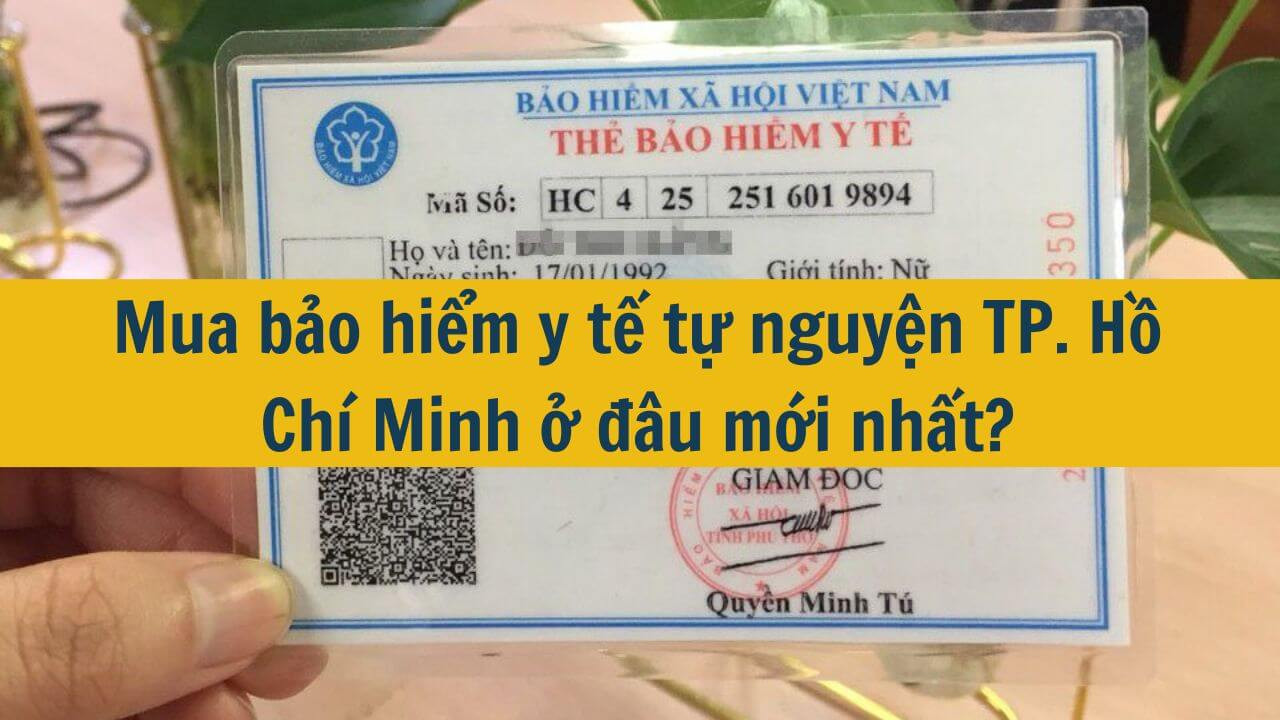
Mua bảo hiểm y tế tự nguyện TP. Hồ Chí Minh ở đâu mới nhất 2025?
Bảo hiểm y tế (BHYT) tự nguyện là giải pháp giúp người dân giảm bớt gánh nặng tài chính khi khám chữa bệnh. Nếu bạn đang sinh sống tại TP. Hồ Chí Minh và muốn tham gia BHYT tự nguyện trong năm 2025, việc nắm rõ địa điểm đăng ký, thủ tục và mức đóng là rất quan trọng. Vậy mua BHYT tự nguyện ở đâu tại TP. Hồ Chí Minh? Cần chuẩn bị những gì? Bài viết này sẽ cung cấp thông tin chi tiết, giúp bạn dễ dàng đăng ký và tận hưởng quyền lợi từ chính sách bảo hiểm y tế. 09/03/2025Mua bảo hiểm y tế tự nguyện Hà Nội ở đâu mới nhất 2025?
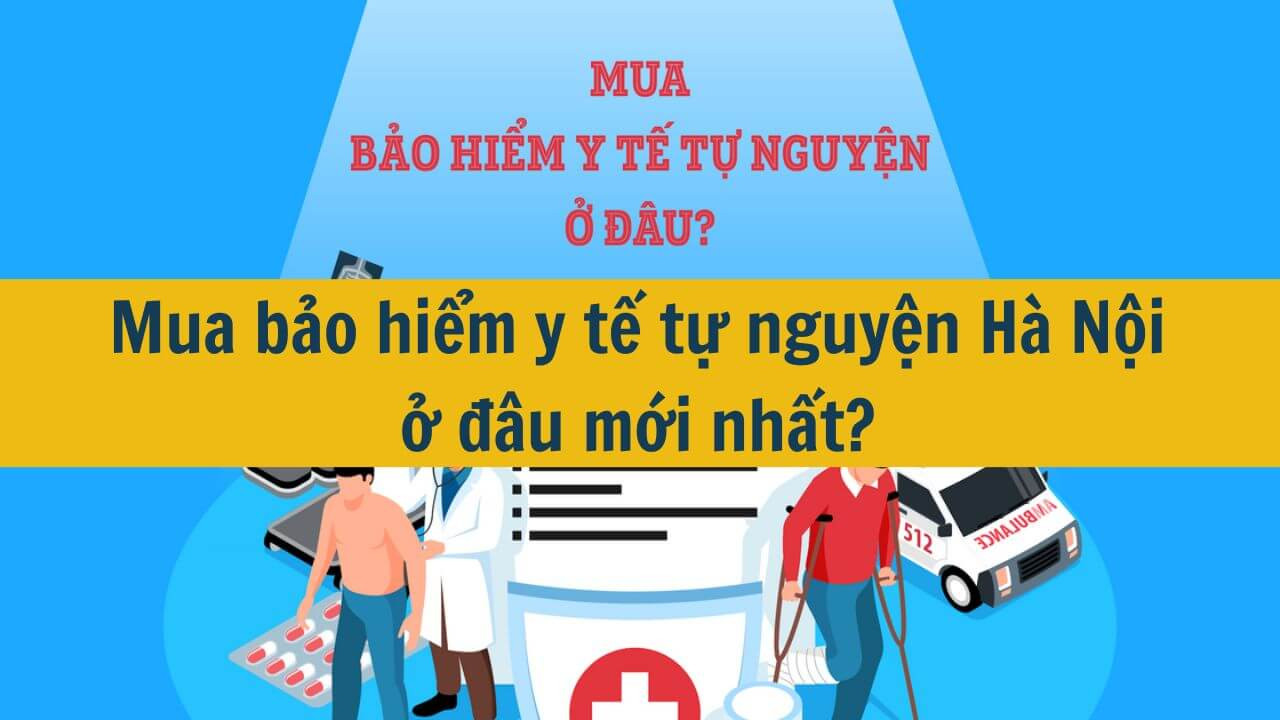
Mua bảo hiểm y tế tự nguyện Hà Nội ở đâu mới nhất 2025?
Bảo hiểm y tế (BHYT) tự nguyện là lựa chọn phù hợp cho những người không thuộc diện tham gia BHYT bắt buộc, giúp giảm bớt chi phí khám chữa bệnh. Nếu bạn đang sinh sống và làm việc tại Hà Nội, chắc hẳn sẽ quan tâm đến địa điểm đăng ký và mua BHYT tự nguyện trong năm 2025. Vậy tại Hà Nội, người dân có thể mua BHYT tự nguyện ở đâu? Thủ tục đăng ký như thế nào? Bài viết này sẽ cung cấp thông tin chi tiết về các điểm đăng ký BHYT tự nguyện mới nhất để bạn dễ dàng tham gia và hưởng quyền lợi bảo hiểm y tế. 09/03/2025Dùng BHYT tự nguyện được khám ở đâu? Có được khám trái tuyến khi dùng BHYT tự nguyện không?
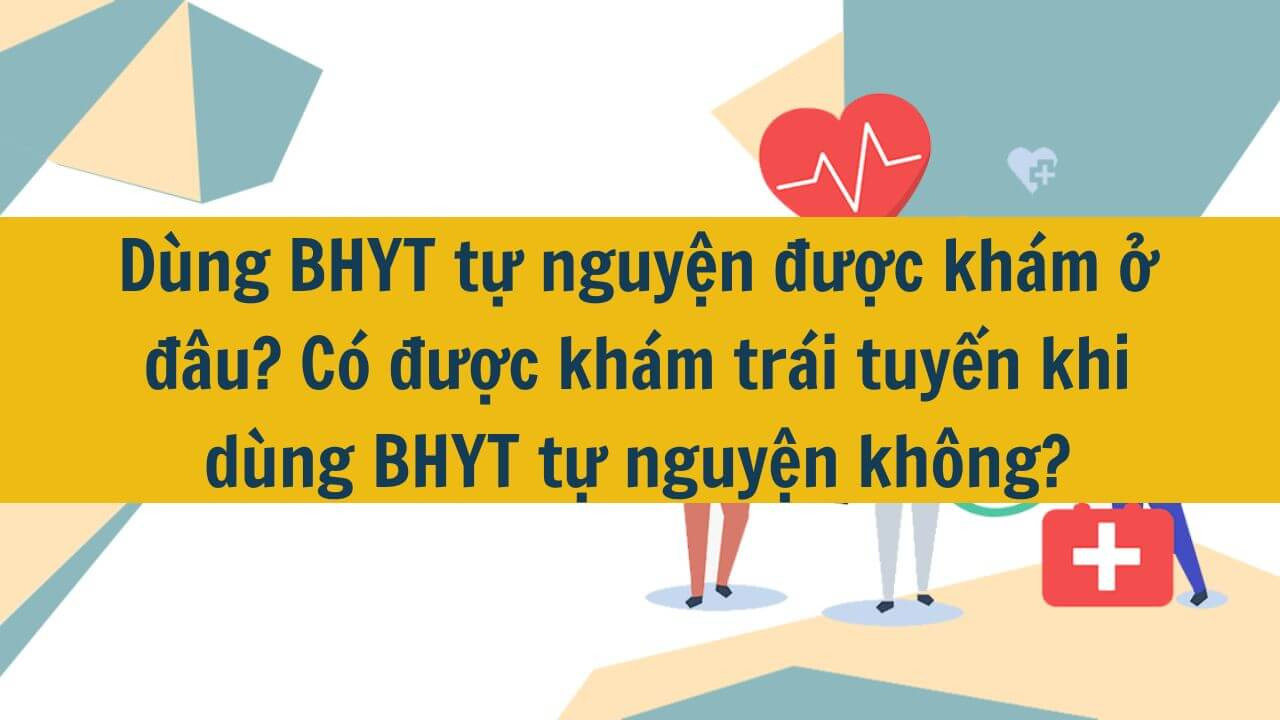
Dùng BHYT tự nguyện được khám ở đâu? Có được khám trái tuyến khi dùng BHYT tự nguyện không?
Bảo hiểm y tế (BHYT) tự nguyện là giải pháp giúp người dân tiếp cận dịch vụ y tế với chi phí thấp hơn. Khi tham gia BHYT tự nguyện, nhiều người thắc mắc về nơi khám chữa bệnh, đặc biệt là quyền lợi khi đi khám trái tuyến. Liệu có thể sử dụng thẻ BHYT tự nguyện tại bất kỳ cơ sở y tế nào không? Khi khám trái tuyến, mức hưởng bảo hiểm như thế nào? Bài viết này sẽ giải đáp chi tiết, giúp bạn hiểu rõ quy định và tận dụng tốt nhất quyền lợi từ BHYT tự nguyện trong năm 2025. 09/03/2025Quyền lợi BHYT tự nguyện gồm những gì mới nhất 2025?

Quyền lợi BHYT tự nguyện gồm những gì mới nhất 2025?
Bảo hiểm y tế (BHYT) tự nguyện là chính sách an sinh quan trọng, giúp người dân giảm bớt gánh nặng tài chính khi khám chữa bệnh. Từ ngày 01/07/2025, nhiều thay đổi mới về quyền lợi BHYT tự nguyện sẽ chính thức có hiệu lực, mở rộng phạm vi chi trả và hỗ trợ tốt hơn cho người tham gia. Vậy cụ thể, người tham gia BHYT tự nguyện sẽ được hưởng những quyền lợi gì? Bài viết này sẽ cập nhật đầy đủ thông tin mới nhất để bạn nắm rõ và tận dụng tối đa lợi ích từ chính sách bảo hiểm y tế. 09/03/2025Bảo hiểm y tế tự nguyện là gì? Mua BHYT tự nguyện thế nào mới nhất 2025
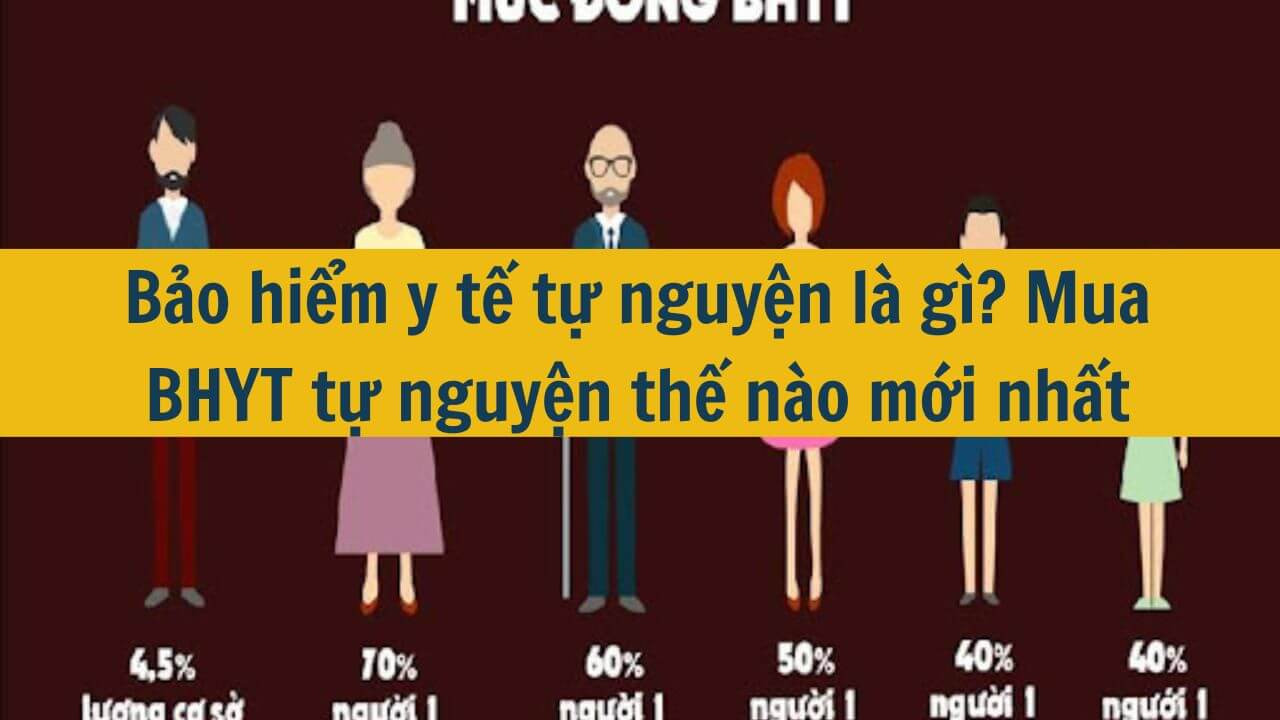
Bảo hiểm y tế tự nguyện là gì? Mua BHYT tự nguyện thế nào mới nhất 2025
Bảo hiểm y tế (BHYT) tự nguyện là hình thức bảo hiểm do Nhà nước tổ chức, giúp người dân không thuộc diện tham gia BHYT bắt buộc vẫn có thể hưởng quyền lợi khi khám chữa bệnh. Đây là giải pháp tài chính hiệu quả, giúp giảm bớt chi phí y tế khi gặp rủi ro sức khỏe. Vậy BHYT tự nguyện có những đặc điểm gì? Năm 2025, thủ tục đăng ký, mức đóng và quyền lợi ra sao? Bài viết này sẽ cung cấp thông tin chi tiết để bạn dễ dàng tham gia và hưởng lợi từ chính sách an sinh quan trọng này. 09/03/2025Bảo hiểm y tế 5 năm được bao nhiêu tiền mới nhất 2025?
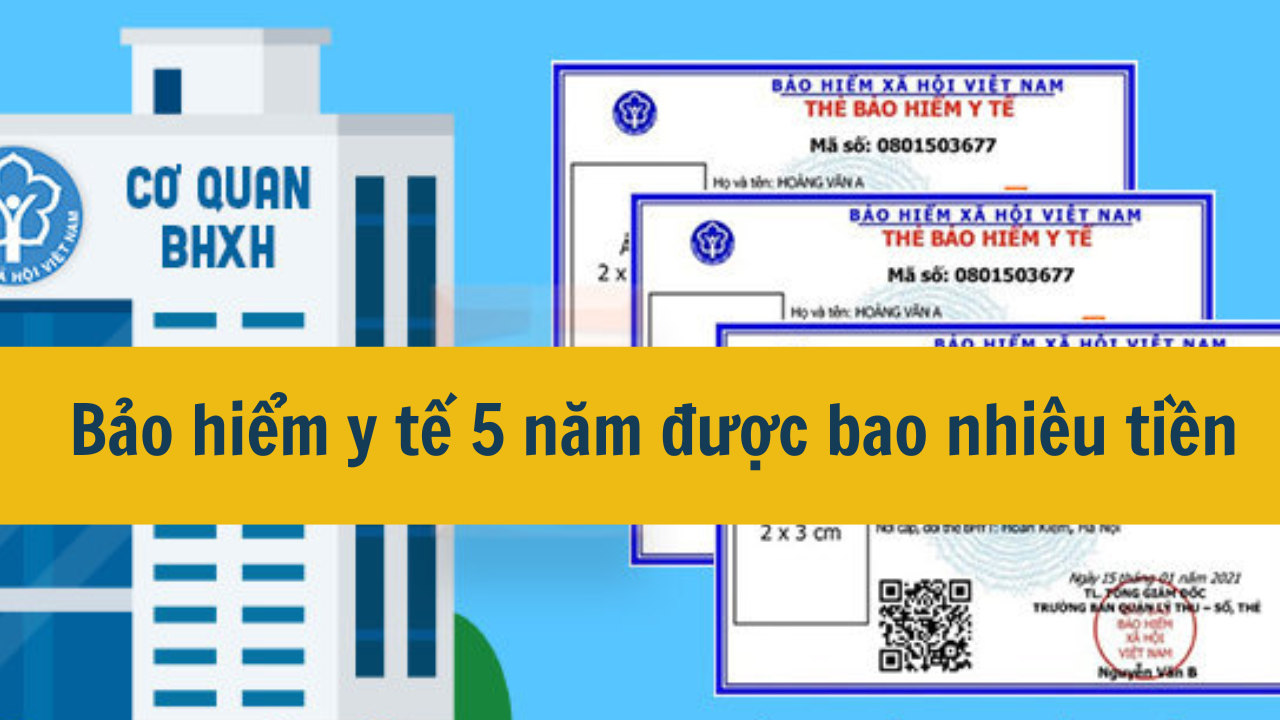
Bảo hiểm y tế 5 năm được bao nhiêu tiền mới nhất 2025?
Bảo hiểm y tế (BHYT) là chính sách an sinh xã hội quan trọng, giúp giảm bớt gánh nặng tài chính khi khám chữa bệnh. Trong đó, người tham gia BHYT liên tục từ 5 năm trở lên có thể được hưởng quyền lợi đặc biệt, bao gồm việc thanh toán 100% chi phí điều trị nếu đáp ứng các điều kiện nhất định. Vậy điều kiện cụ thể là gì? Mức hưởng tối đa bao nhiêu? Và những thay đổi mới nhất từ năm 2024 có ảnh hưởng ra sao? Hãy cùng tìm hiểu chi tiết trong bài viết dưới đây. 03/03/2025Thủ tục xin cấp lại thẻ BHYT trẻ em trên 6 tuổi mới nhất 2025
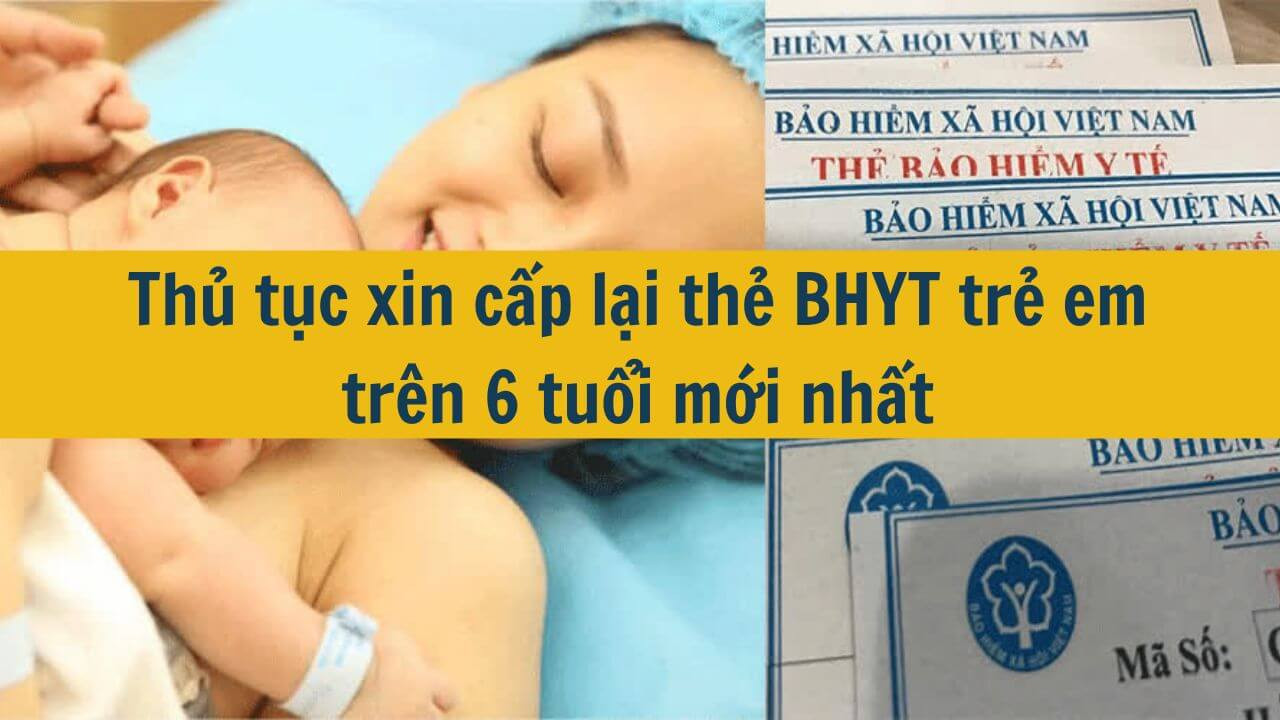
Thủ tục xin cấp lại thẻ BHYT trẻ em trên 6 tuổi mới nhất 2025
Thẻ bảo hiểm y tế (BHYT) là giấy tờ quan trọng giúp trẻ em được hưởng quyền lợi khám chữa bệnh theo chính sách của Nhà nước. Tuy nhiên, trong quá trình sử dụng, thẻ BHYT có thể bị mất, hỏng hoặc cần điều chỉnh thông tin, khiến nhiều phụ huynh lo lắng về thủ tục cấp lại. Để đảm bảo quyền lợi y tế không bị gián đoạn, cha mẹ cần nắm rõ quy trình xin cấp lại thẻ BHYT cho trẻ trên 6 tuổi theo quy định mới nhất năm 2025. Bài viết này sẽ hướng dẫn chi tiết các bước thực hiện, hồ sơ cần chuẩn bị và thời gian giải quyết để giúp phụ huynh dễ dàng hoàn thành thủ tục một cách nhanh chóng và thuận tiện. 03/03/2025Bảo hiểm y tế trẻ em khi nào hết hạn mới nhất 2025?

Bảo hiểm y tế trẻ em khi nào hết hạn mới nhất 2025?
Bảo hiểm y tế (BHYT) dành cho trẻ em là chính sách quan trọng giúp đảm bảo quyền lợi khám chữa bệnh ngay từ những năm đầu đời. Tuy nhiên, nhiều phụ huynh thắc mắc về thời điểm thẻ BHYT của trẻ hết hạn và cách tiếp tục tham gia để tránh gián đoạn quyền lợi y tế. Đặc biệt, từ năm 2025, quy định về thời gian hiệu lực của thẻ BHYT trẻ em có thể có những cập nhật mới. Bài viết này sẽ cung cấp thông tin chi tiết về thời điểm thẻ BHYT trẻ em hết hạn và hướng dẫn cha mẹ cách gia hạn hoặc đăng ký mua BHYT cho trẻ trên 6 tuổi. 03/03/2025Mua bảo hiểm y tế cho trẻ trên 6 tuổi ở đâu mới nhất 2025?
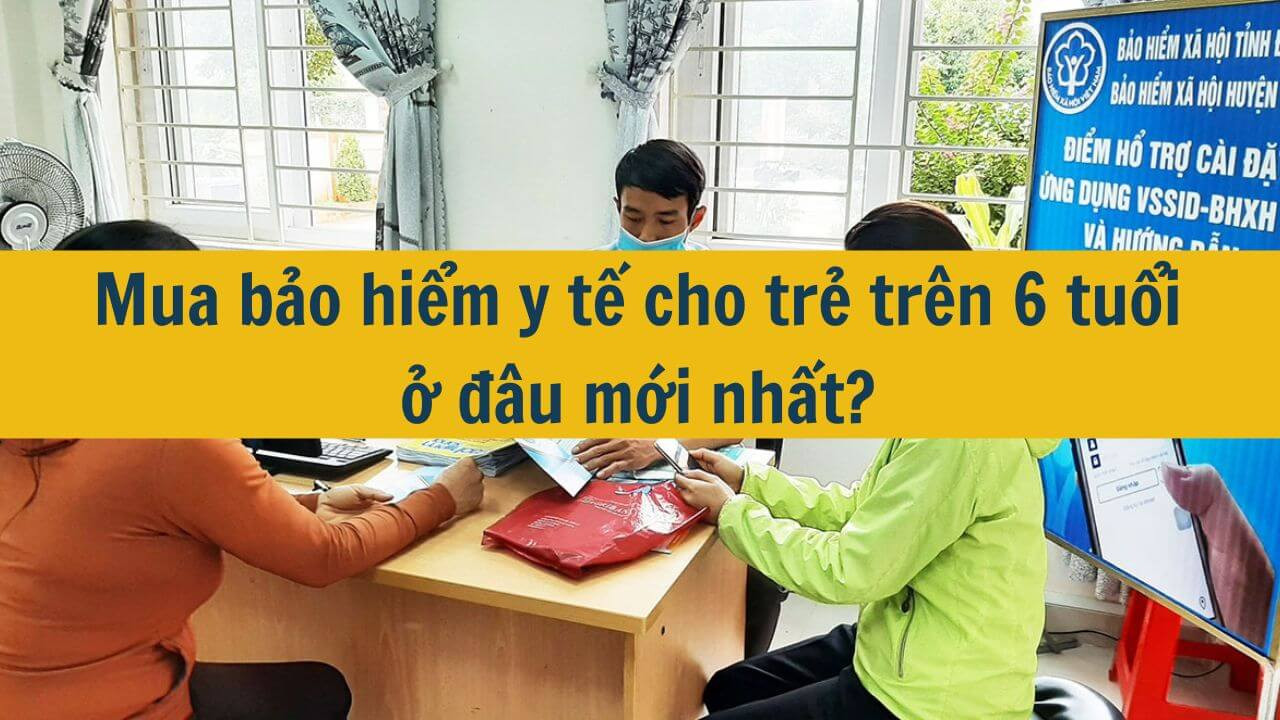
Mua bảo hiểm y tế cho trẻ trên 6 tuổi ở đâu mới nhất 2025?
Bảo hiểm y tế (BHYT) là chính sách quan trọng giúp bảo vệ sức khỏe và giảm gánh nặng chi phí khám chữa bệnh cho trẻ em. Khi trẻ bước sang 6 tuổi, thẻ BHYT cấp miễn phí trước đó sẽ hết hạn, và phụ huynh cần chủ động mua BHYT để đảm bảo quyền lợi tiếp tục cho con. Vậy trong năm 2025, cha mẹ có thể mua bảo hiểm y tế cho trẻ trên 6 tuổi ở đâu? Bài viết này sẽ cung cấp thông tin mới nhất về các điểm đăng ký, hình thức tham gia và thủ tục cần thiết để đảm bảo trẻ luôn được chăm sóc sức khỏe tốt nhất. 07/03/2025Trẻ em 6 tuổi được hưởng quyền lợi BHYT đến thời điểm nào?


 Luật bảo hiểm y tế 2008 (Bản Pdf)
Luật bảo hiểm y tế 2008 (Bản Pdf)
 Luật bảo hiểm y tế 2008 (Bản Word)
Luật bảo hiểm y tế 2008 (Bản Word)